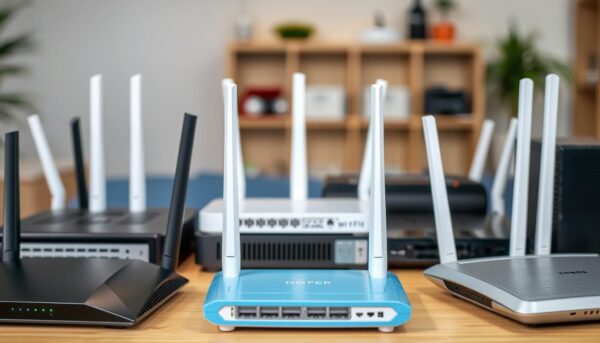Ever wondered how your devices connect to the internet? Your router is the hero behind this. It’s key to your internet connection, directing data and keeping you online.
A router connects to your modem, sharing the internet with many devices. It’s like a traffic director, making sure data gets where it needs to go.
In today’s world, routers are essential. With 11 devices per household, they work hard to keep everything connected. They power your streaming and smart home gadgets.
Let’s explore how routers shape your internet. Understanding them is crucial for a better connection. Are you ready to learn about your gateway to the internet?
Key Takeaways
- Routers direct data traffic between your devices and the internet
- The average household has 11 connected devices relying on a router
- Routers play a crucial role in both wired and wireless connections
- Understanding your router can help optimize your internet experience
- Modern routers often include security features like firewalls
- The global router market is projected to grow significantly in coming years
Understanding Router Basics
Routers are key devices that link your home to the internet. They manage internet traffic, assign IP addresses, and set up local networks for your devices. Let’s explore their main functions, types, and parts to understand their role in our connected lives.
Core Router Functions
A router’s main task is to manage network traffic well. It acts like a traffic cop, directing data packets between devices and the internet. Routers also do Network Address Translation (NAT), letting many devices use one internet connection. This is vital for how routers work in homes and businesses.
Types of Routers
There are many types of routers, each for different needs:
- Wireless Routers: Common in homes, support Wi-Fi connections
- Wired Routers: Used in businesses for fast, stable connections
- Core Routers: Powerful devices for internet service providers
- Edge Routers: Connect internal networks to the outside world

Router Components
Knowing about router parts helps you choose the right one. Key parts include:
| Component | Function |
|---|---|
| CPU | Processes data and manages traffic |
| RAM | Stores temporary data for quick access |
| Antennas | Transmit and receive wireless signals |
| Ethernet Ports | Connect wired devices to the network |
Today’s routers also have extra features like firewalls, Quality of Service (QoS) controls, and parental controls. These parts work together to make a safe, efficient network that fits your needs.
How Routers Connect Your Digital World
Routers are key in linking your devices to the internet. Knowing how they function can enhance your online experience.
Internet Connection Process
When you ask for something online, your router gets to work. It gives your device a special ID using Network Address Translation (NAT). This lets many devices use one internet connection at home.
Network Address Translation (NAT)
NAT is a router’s main job. It changes your device’s private address to its own public one. This way, up to 250 devices can share one internet. It also keeps your devices safe by hiding their IP addresses.
Local vs Wide Area Networks
Your home network is a Local Area Network (LAN). It’s small, like your house or office. The router links your LAN to the Wide Area Network (WAN), which is the internet. LANs can go up to 300 feet outdoors, but WANs cover huge areas, linking networks worldwide.
- LANs use private IP addresses
- WANs use public IP addresses
- Your router connects your LAN to the WAN
Understanding these concepts shows how your router is the heart of your digital world. It connects your devices to the internet.
Router Security and Network Protection
Your router is your first defense against cyber threats. It keeps your network safe and your personal info secure.
Built-in Firewall Features
Most routers have built-in firewalls for extra protection. These firewalls check incoming data packets to block threats. For example, ASUS AiProtection uses Trend Micro™ to protect without a subscription.
Encryption Standards and Protocols
Routers use encryption to protect your data. They support advanced standards like WPA2 and WPA3. ASUS routers also offer VPN features for more privacy, like Instant Guard.

Network Security Best Practices
To keep your router secure:
- Create strong, unique passwords for your network and router admin panel
- Regularly update your router’s firmware
- Enable Network Address Translation (NAT) to mask your devices’ IP addresses
- Use guest networks for visitors to keep your main network secure
- Utilize parental controls to monitor and customize settings for children’s devices
By following these steps, you can greatly reduce cyber attack risks. A strong network protection strategy can block up to 95% of known threats.
Optimizing Your Router Performance
Want to boost your WiFi speed? Let’s explore some router optimization tips. First, place your router in a central location. This simple move can greatly improve signal strength and reduce interference.
Updating your router’s firmware is key for better network performance. It fixes bugs and boosts efficiency. Many routers have auto-update features, so check your settings.
Choosing the right WiFi channel is important for performance. Channels 1, 6, and 11 on the 2.4GHz band have less interference. For 5GHz, wider channels like 160MHz offer faster data rates.
- Use Quality of Service (QoS) settings to prioritize traffic
- Enable guest networks for enhanced security
- Consider upgrading to WiFi 6 or 6E for better speeds
If you’re still facing issues, a WiFi mesh system might be the answer. These systems combine WiFi 6 technology with whole-home coverage, offering a seamless network experience.
| Router Type | Average Price | Key Feature |
|---|---|---|
| TP-Link Archer AX50 | $99.00 | Budget-friendly WiFi 6 |
| Asus ROG Rapture GT-AC5300 | $399.99 | High-performance gaming |
| eero 6+ | $139.99 | Mesh system compatibility |
Remember, Ethernet connections often outperform WiFi for speed and stability. Consider this option for devices like gaming consoles or desktop PCs that need consistent, high-speed connections.
Conclusion
Routers are key to our digital lives, connecting us to the internet and managing our networks. They do more than just link us online. They are vital for home network security, sharing resources, and a smooth online experience.
Routers are getting better, making our online activities faster and more reliable. They support streaming high-quality videos and connecting smart home devices. This shows how routers are adapting to our digital needs.
Knowing what your router can do helps you make better choices. Whether you choose a budget-friendly AC1200 or a top-tier tri-band model, it affects your network’s performance. A well-managed router boosts your internet experience and keeps your digital life safe.
Looking ahead, router technology will keep improving. With features like built-in VPNs and cloud-based virtual routers, they’ll play an even bigger role in our connected lives. By staying informed and managing your network well, you’ll enjoy a smoother, safer, and more efficient digital journey.